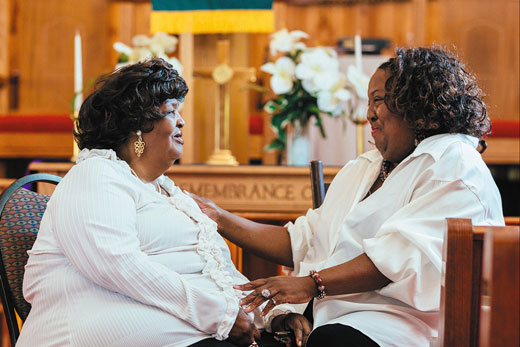A recent $3.1 million gift from an anonymous donor will support a new initiative to allow the nurse-managed Integrated Memory Care Clinic (IMCC) to expand to continue serving their patients living with dementia and residing in senior living communities, such as assisted living.
“We want to continue to provide support and care for our patients and their care partners, so that they may maintain their health while in assisted living,” said IMCC Director Carolyn Clevenger, RN, DNP, AGPCNP-BC, GNP-BC, FAANP. “By providing optimal primary care as well as dementia care, we help families avoid unnecessary inpatient hospitalizations and receive late-stage and end-of-life care that matches their preferences. This gift reinforces that our work values partnering with patients and families to maintain dignity and optimize their quality of life.”
The IMCC is the first clinic in the nation to fully integrate primary care for people living with dementia and is the first nurse-led, primary-care medical home at Emory Healthcare. The IMCC was established as a partnership between the Nell Hodgson Woodruff School of Nursing and Emory Brain Health Center. This anonymous gift allows the IMCC to further innovate in community care—the term for seeing patients who are in assisted living or personal care homes.
This gift, like the previous $2 million gifts initially funding the IMCC in 2015, recognizes the School of Nursing’s success in creating new ways to provide innovative patient care, said Dean Linda A. McCauley.
“The IMCC’s nurse-managed model of care for patients with Alzheimer's and different types of dementia is critically important to them and their caregivers and families,” McCauley said. “When families have a beloved family member diagnosed with a cognitive disease and prepare to go through the downward spiral with that patient, the IMCC and this anonymous donor recognize the critically important role that nurses play.”
“We are all about following the patient, with their family, wherever they are in their journey,” Clevenger said. “We treat their families as part of our team, and we come up with a plan together. When a patient has had to move to assisted living, the family often has to make the difficult choice: to leave the relationship with the IMCC or to join the senior community’s domiciliary program that is often more convenient. The decision to switch care providers means losing our years-long relationship for the family; this anonymous gift means that families living with dementia won’t have to make this difficult choice and can remain with the IMCC."
IMCC community care is slated to begin later this year after the IMCC formalizes agreements with senior living communities. The continuation of IMCC care means each patient can count on a nurse-led team to identify and manage symptoms of dementia, to prevent and treat co-existing health conditions, and to support families in order to optimize the quality of life. Each patient and care partner has 24/7 access to on-call IMCC nurse practitioners. The new program also incorporates additional team members in occupational therapy to engage and support the patient every week.
“Families look for access to someone who understands, through the lens of dementia, what they and their loved one are going through,” Clevenger said. “They want access to simple solutions in one practice, not the complicated usual system of care that sends them to various practices and specialists. When they need to get us, they pick up the phone and call us, and they get us.”
Community care will provide something new from IMCC: occupational therapy, which isn’t typical in outpatient primary care. The occupational therapist will develop individualized care goals to help people living with dementia maintain the highest level of independence possible based on their disease stage. The anonymous gift also will help hire more IMCC staff, called community care workers, to visit each patient once a week for 90 minutes.
“In a typical visit, a community care worker may offer some brain-stimulating games, encourage reminiscing, set up the kitchenette or bathroom to promote independence in self-care, or layout the clothes in the closet in the order that they are put on,” Clevenger said. “This will give the IMCC team better insight into the day-to-day needs of our patients and better collaboration with their senior living community.”
The community care worker will provide observations and details from each visit through a secure online portal that can be accessed by patient families.
Clevenger expects the IMCC’s capacity to rise from approximately 550 current patients in the clinic to 900 with community care. Through membership fees from patients and their families, the community care model will eventually be financially self-sustaining. “Community care is as much about our mission and the feasibility for patients as it is about a sound business plan,” Clevenger said.

